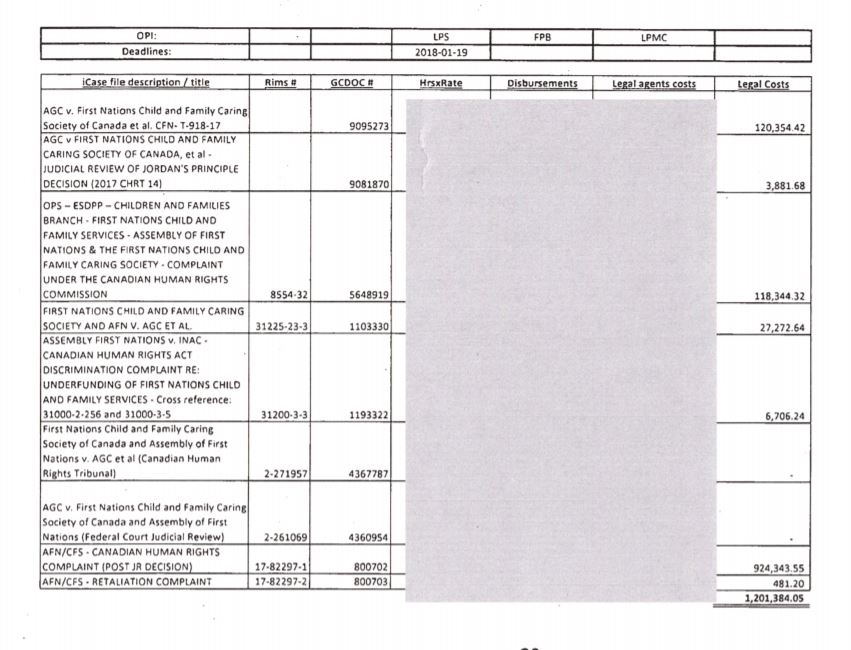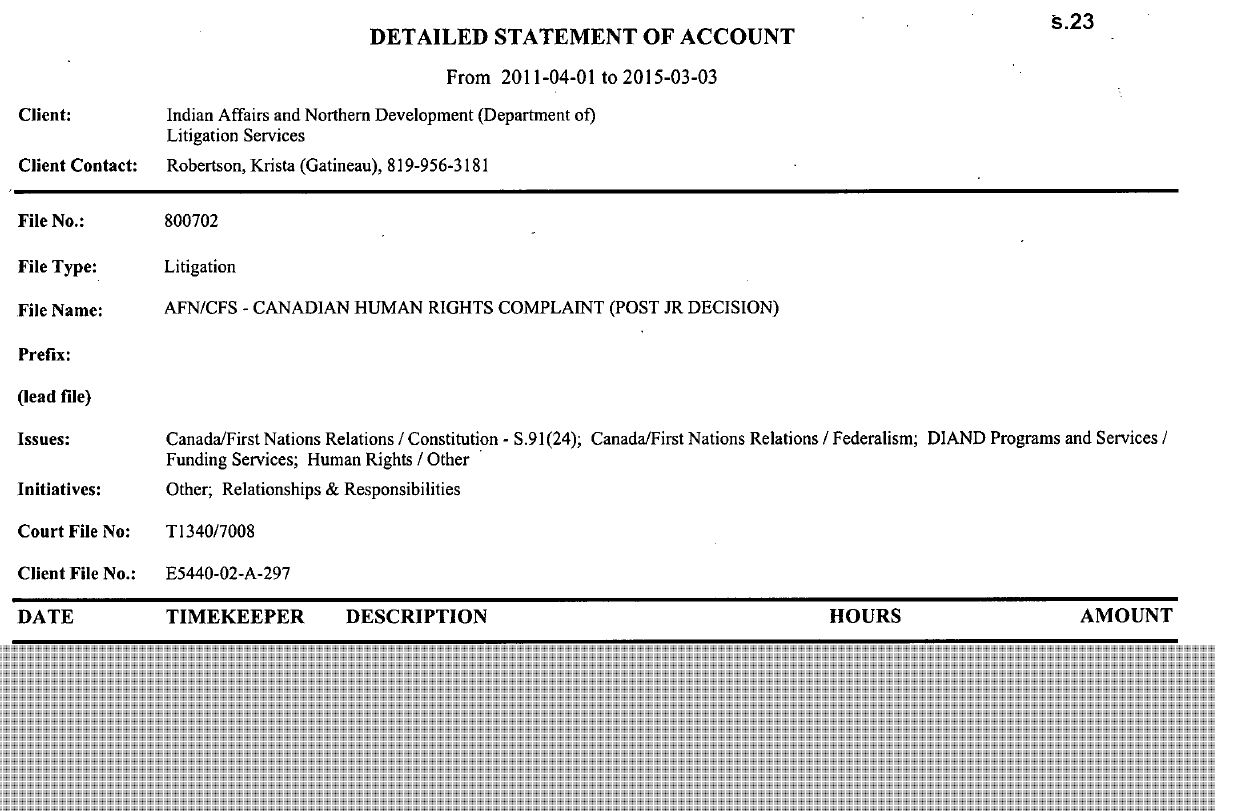
The federal government claims it has spent $5,261,009 in legal costs over the last 13 years to first fight Cindy Blackstock’s human rights complaint and continue to do so after it was found guilty.
This figure is wrong, according to documents reviewed by APTN News.
In fact, APTN found the number is likely closer to $8.3 million as of 2017.
“If they won’t admit this in the face of documents to prove it, then it helps explain how deeply entrenched their refusal to acknowledge their ongoing discrimination is,” Cindy Blackstock told APTN, referring to documents she obtained through access to information laws (ATIP) since first filing her human rights complaint Feb. 27, 2007, along with the Assembly of First Nations.
“They don’t want to accept responsibility for anything – including their own documents.”
The Canadian Human Rights Tribunal found Canada guilty Jan. 26, 2016 for purposely underfunding on-reserve child welfare that led to an increase of apprehensions and deaths.
The government’s number is narrowly based on just the calculation of hours recorded by Justice department lawyers.
It excludes other costs directly related to the tribunal, which is what NDP MP Charlie Angus said he asked for when he used a parliamentary tool that’s supposed to elicit correct responses from government, known as an order paper question.
On Dec. 9, 2019 Angus asked in part the Justice department this: “How much money has been spent in total on legal proceedings pursuant or related to the decision of the Canadian Human Rights Tribunal since 2007?”
Justice Minister David Lametti responded: “Based upon the hours recorded, the total amount of legal costs incurred amounts to approximately $5,261,009.14 as of December 9, 2019.”
But Angus said he didn’t just ask for the billable hours.
“It’s out and out political misrepresentation,” said Angus Wednesday. “They don’t want the real number out there.”
So what’s the real number?
Blackstock said it’s $9.4 million based on her documents where she asked for all legal costs at the tribunal, but also at the Federal Court of Canada and the Federal Court of Appeal, both of which have been used during her fight to prove Canada purposely underfunded on-reserve child welfare resulting in too many needless apprehensions and deaths.
Lametti’s office said it couldn’t comment on Blackstock’s number without first seeing her documents, so Blackstock posted them on her website and tweeted the link Monday evening.
APTN reviewed Blackstock’s heavily redacted documents and determined they suggest the number is closer to approximately $8.3 million as of Nov. 30, 2017, which is as far as her documents go, meaning there are still two years of legal fees unaccounted for.
This is how we came to that number.
The Justice department has at least nine categories it has uses for legal fees associated with the case.
The figures below are for the period of Jan. 26, 2016 to Nov. 30, 2017 and was provided to Blackstock by the Justice department through an ATIP when she asked for all legal fees related to the case.

We reviewed the invoices throughout Blackstock’s documents tracing file numbers back to those categories on the left side of the chart above.
Following this methodology, APTN reached a number of $7.4 million for the legal billing, including costs associated to fighting APTN at the tribunal, and the Federal Court, when APTN successfully won the right to broadcast tribunal’s hearings. Where there appeared to be duplication we didn’t include it in the total.
Below is one of the invoices and always the largest category throughout the years. This was for $2.29 million.

It’s unclear if the Justice department included all categories in their costs. APTN asked Lametti’s office if they only looked at the “AFN/CFS Canadian Human Rights Tribunal (Post JR decision)” category as it would have likely provided a number close to $5.2 by itself.
Lametti’s office punted APTN’s questions over to the Justice department, after this story was published, which didn’t specifically address them. Instead a spokesperson responded zeroing in on the wording of the order paper question specifically saying Angus asked for money pursuant to the tribunal proceedings as of 2007, “including the money spent on legal proceedings such as appeals or motions to stay in relation to the Tribunal 2016 decision.”
Angus also specifically asked for money related to Federal Court after the tribunal’s ruling in his question. APTN followed up asking the Justice department if it left out all costs related to Federal Court before the Jan. 26, 2016.
“We have looked into your questions and are unable to provide further details of the legal costs as they are protected by solicitor-client privilege,” said a department spokesperson, in an email sent two days after this story was first published.
There are other costs associated with this case and that’s how APTN reached $8.3 million in fees.
Those costs include money paid to companies hired by Canada in its fight against Blackstock to go over 90,000 documents that Canada was withholding from the tribunal until Blackstock found out and fought to have them released.
The billing is heavily redacted and some bills are completely blacked out. But it appears approximately $500,000 was paid to have these documents reviewed by at least one third-party company.
But there is another fee paid to a company and this one turned out to be a fatal blow to Canada.
According to the terms of reference of a contract, KPMG was allocated $365,000 in 2010 to review a 2005 report entitled: Wen:de The Journey Continues.
The goal was to offer a critique of the report, which Canada hoped to use to fight back against Blackstock’s claims.
After all, the report was at the heart of the entire case and the kicker is the report was commissioned by the department formally known as Indian and Northern Affairs Canada (INAC).
The Wen:de report determined that between 1995 to 2005 Canada underfunded on-reserve child welfare by 21 per cent, based on the fact that during that time it didn’t provide any increases to funding to account for inflation.
The total allocated remained $100 million for 10 years, excluding Ontario, which had a different funding formula.
INAC didn’t just pay for the report, but was active participants in its development providing data needed.
KPMG then confirmed 21 per cent in underfunding was correct.
But Canada didn’t table KPMG’s report at the tribunal said Blackstock, who said she first obtained it through an ATIP.
Blackstock then called a number of witnesses to support Wen:de’s findings, including John Loxley, who played a key role in developing the Wen:de report.
“[KPMG] found a few errors. I went through that carefully. I think every one of them is correct, that what they found is correct. These added up to .012 percent of our recommendations. They concluded that these were not material. I would conclude that that’s incredible that you’re doing this study in two and a half months with literally thousands and thousands of data entries, changing your assumptions as you go, and to come in with that kind of accuracy is, I think, unusual. And so, again, I was quite happy,” Loxley testified Sept. 11, 2013 at the tribunal.
“0.12 per cent.”
Loxley also testified about how little on-reserve child welfare received for prevention-based services, so agencies sometimes were forced remove children because they didn’t have money to keep children with their families.
“There was a small amount provided in theory, but in practice very little of that, so we were told, was actually ever spent because the funding formula was insufficient, the amount of money was insufficient and so prevention was always left out,” he said.
Canada never called a witness to support KPMG report said Blackstock.
“It was a key piece and the fact that they could not find a single expert witness who would testify in their favour. The feds were trying to disprove the inequality but their own experts (KPMG) confirmed it,” said Blackstock.
“What is remarkable about that is that even when their own expert agreed with us – Canada fought on.”
The fees don’t stop there. Blackstock has a bill from the Justice department for approximately $125,000 for travel-related expenses just in 2013 and 2014.
“Canada did not use DOJ lawyers from Ottawa even though the hearing was here. Instead, they flew in lawyers from Halifax and Vancouver. I wanted to see what that was costing everyone,” said Blackstock.
There’s also the $20,000 the tribunal ordered Canada to pay Blackstock for having bureaucrats spy on her. They also blocked her from meetings. Blackstock argued at the tribunal this was in retaliation and there would be more legal fees associated.
Blackstock didn’t pocket the money, rather donated it to children’s causes.
Not included in all of these costs is staff time from various departments or ministries to fight First Nations children.
And the fight continues to this day as the federal government fights the tribunal’s order in September to award each child $40,000, as well as a pending class-action lawsuit for First Nations children dating back to 1991, as the tribunal only goes back to 2006.










When Trudeau’s government treats Canadians, particularly First Nation
Canadians, this badly then its a government that is against the people –
all people. NeoLiberals behave like this and its wrong.Trouble is…the CONservatives agree with Liberals and continue to vote and behave the same as in the Harper days.
While I definitely find the information provided very difficult to learn…these enraging facts needs to be known, shared and dealt with. People…write your MP, Trudeau, Marc Miller, Carolyn Bennett and David Lametti – Minister of Justice and Attorney General of Canada.
I am 73 years old and have spent my entire adult life in the northern parts of this nation. I lived in Ontario, Alberta, British Columbia and currently reside in Saskatchewan. This type of thing has been par for the course with just about every government I can remember excepting John Diefenbaker. It is a national disgrace. The current regime of Justin Trudeau ranks as the worst by far for doggedly spending money flogging dead horses and never dropping a case and getting on with solving the problem. Not one government has been great and only one passingly good but I can assure you that today’s liberal’s for sure will not be the messiah needed to correct this abomination.